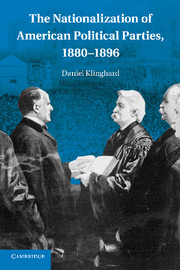Book contents
- Frontmatter
- Contents
- Preface
- Acknowledgments
- Introduction
- 1 Localism and the Jacksonian Mode
- 2 The Nineteenth-Century Associational Explosion and the Challenge to the Jacksonian Mode
- 3 Organizational Transformation and the National Parties
- 4 National Campaign Clubs and the Party-in-the-Electorate
- 5 Grover Cleveland and the Emergence of Presidential Party Leadership
- 6 Party Transformation in the Republican Party
- Conclusion
- Selected Bibliography
- Index
- References
5 - Grover Cleveland and the Emergence of Presidential Party Leadership
Published online by Cambridge University Press: 06 July 2010
- Frontmatter
- Contents
- Preface
- Acknowledgments
- Introduction
- 1 Localism and the Jacksonian Mode
- 2 The Nineteenth-Century Associational Explosion and the Challenge to the Jacksonian Mode
- 3 Organizational Transformation and the National Parties
- 4 National Campaign Clubs and the Party-in-the-Electorate
- 5 Grover Cleveland and the Emergence of Presidential Party Leadership
- 6 Party Transformation in the Republican Party
- Conclusion
- Selected Bibliography
- Index
- References
Summary
As part of its broader effort to limit national political forces, the Jacksonian mode constrained the presidency's independence. The late-nineteenth-century idea of party, however, complemented presidential power and inspired a series of transformative presidential administrations. Grover Cleveland's attempts to force his party to take up tariff reform led to his unprecedented three popular vote victories. William McKinley's portentous reconstruction of the Republican coalition in 1896 was grounded in a crafty convention strategy that took advantage of the previous decades' convention reforms to force his nomination on resistant subnational party organizations. Even the diminutive Benjamin Harrison's oft-derided “front porch campaign” of 1888 was a daring demonstration of presidential candidates' ability to define the terms of their campaigns. Far from a period of presidential forbearance, the years between 1880 and 1900 saw a resurgence of presidential power that changed popular expectations of the presidency. These efforts at carving out political space for national party leadership sped the breakup of the Jacksonian party mode and released presidents from forty-plus years of republican restraints on presidential power.
The Jacksonian nominating convention, paralleling not only the electoral college but also the political geography of the legislative branch, was a distinctive Jacksonian contribution to the American presidency. It canceled out the Founders' decision to make the president responsible to a political constituency distinct from that of the national legislature.
- Type
- Chapter
- Information
- The Nationalization of American Political Parties, 1880–1896 , pp. 144 - 190Publisher: Cambridge University PressPrint publication year: 2010
References
- 1
- Cited by



